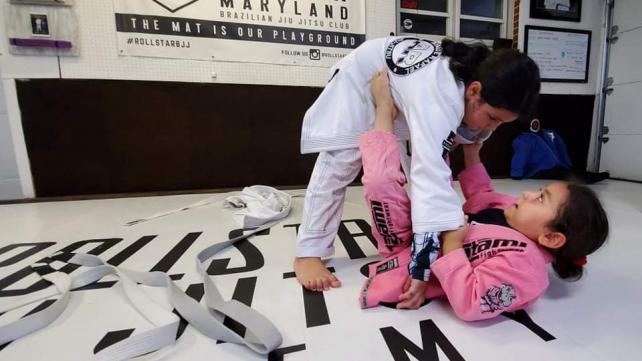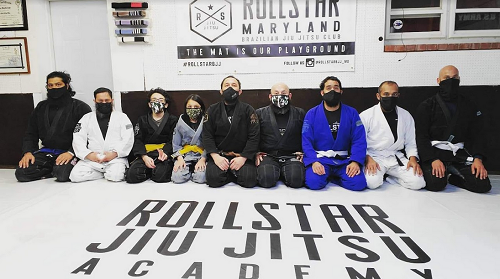
Martial arts classes are more than just exercise, a hobby, or an afterschool program; it complements our way of life as Muslims. The Prophet, peace be upon him, said in an authentic hadith narrated by Abu Hurairah that,
“The strong believer is better and more beloved to Allah than the weak believer, but in both there is good.” (Sahih Muslim)
Scholars have stated that this hadith relates not only to faith, but also to physical strength because it is a means to increase one’s faith. Being in good physical health allows one to perform more acts of worship. The one who exercises, stretches, and eats right will feel much more energetic and alive compared to the one who does not. This energy contributes to the ability to stand in prayer longer, wake up on time for fajr or tahajud, and do charitable acts and other good deeds.
Physical and Emotional Benefits
Martial arts bring about so much benefit for the one who engages in the discipline as a journey toward self-mastery. It increases confidence and leadership abilities and develops agility, flexibility, and coordination in the practitioner. And, of course, it provides the practical knowledge of self-defense. Martial arts teaches humility, respect, and honor in one's interactions. For the individual, it fosters self-awareness, self-control, and integrity in his/her actions. It provides the tools needed to overcome all obstacles with Allah’s help.
Too many youths today are involved in sedentary pastimes that have little to no benefit such as video games, social media, and television. There is a huge increase in obesity and the associated diseases that affect the heart and digestive system. This is unsettling, especially knowing that the Messenger of Allah, peace and blessings be upon him, stated in an authentic hadith, “There are two blessings which many people waste: health and free time.” (Bukhari) Why not have them spend time doing something that will improve their health and endurance? Keeping a healthy lifestyle helps us maintain the mental, physical, and spiritual strength to perform more acts of worship.
Reviving a Sunnah
Indeed, even the Prophet Muhammad, peace be upon him, wrestled. In Abu Dawud, Muḥammad Ibn Ali Ibn Rukanah reported that, “Verily Rukanah wrestled the Prophet, peace be upon him, and the Prophet took him down.” The story behind this hadith is that Rukanah was a famous grappler at the time, and when the Prophet called him to Islam, he challenged him to a fight. The Prophet was able to pin him down three times. Rukanah was so astonished, he embraced Islam. Although some Muslim youth of today are repulsed by fighting and wrestling and afraid of injury and death, the Prophet and the companions were strong fighters. They had no choice but to learn martial arts, sword-fighting, and horseback riding to engage their opponents in battle. The fact of the matter is during a violent encounter, Muslims must defend themselves. Avoiding striking the face is the least of concerns in that sort of situation.
There is a need for martial arts programs in our communities to help put a stop to the obesity epidemic. Muslims throughout history have had a reputation of being disciplined, strong, and courageous. We can see and learn about this through the stories of the companions such as Omar ibn al-Khataab, Khalib ibn al-Waleed, Osama bin Zayd, Abdullah ibn az-Zubayr, and many more. When we read about their lives, we learn that they were true martial artists. They may not have had Black Belts in Jiu Jitsu, Karate, or Kung-Fu, but they lived by a code of conduct integral to the martial arts — loyalty, obedience, respectfulness, mercy, honor, courage, intelligence, and an indomitable spirit. These are the standards of behavior that martial arts schools uphold and pass on to their students.
The practice of the martial arts is an essential discipline that can bring great benefit to Muslims in this age of sedentary lifestyles and obesity. Strength training and conditioning can build endurance and preserve cardiovascular health. Grappling, sparring, and self-defense increases confidence and acute awareness of one’s surroundings, and can aid Muslims in dealing with harassment or hate crimes. Likewise, the general principles of martial arts instill leadership, discipline, integrity, respect, and honor — these are excellent physical, mental, and character assets for men, women, and children alike. Islamic centers and masjids can serve their communities well by establishing such programs. This is a means for all of us to be better than the weak believers and be of those who are more beloved to Allah.

My own family has been involved in martial arts for many years and has experienced its enormous benefits. When my husband’s parents enrolled their 8-year-old son in Kung Fu decades ago, little did they know they were laying a foundation for their future grandchildren. The martial arts values and practices my husband learned with his early Kung-Fu and karate training and more recently, earning a black belt in Brazilian Jiu Jitsu, are being instilled in our children. All of them have learned some aspects of Brazilian Jiu Jitsu and self-defense, however, they are not always keen to practice on a regular basis. And that is ok. Even when there is no physical training, we strive to teach our children the importance of being mentally strong, focused, and persevering when confronted with challenges. Martial arts is more than just learning how to physically fight, it is about knowing what to do so you don’t have to. The Prophet, peace and blessings be upon him, said, “The strong are not the best wrestlers. Verily, the strong are only those who control themselves when they are angry.” (Bukhari, Muslim)
More Details about this Discipline
Brazilian Jiu Jitsu grappling has become increasingly popular as a martial art because it perfectly complements the stand-up strikes and kicks taught in other disciplines. It also employs effective, non-violent self-defense techniques. The intention behind Brazilian Jiu Jitsu is to subdue an opponent with the least amount of effort and harm. This art initially came about as a way for smaller individuals to protect themselves on the ground from a larger opponent during a street fight. Using simple leverage as a weapon, practitioners can neutralize a situation without even throwing a punch. It is often called the “gentle art,” and its humane approach is especially appealing to Muslim martial artists.
Brazilian Jiu Jitsu, also known as Gracie Jiu Jitsu, was developed by the Gracie family. Two brothers, Carlos and Helio, fashioned their own style of Jiu Jitsu in Brazil. In the early 90’s, Gracie Jiu Jitsu became popular in the U.S. after the establishment of The Ultimate Fighting Championship (UFC), in which Royce Gracie, the son of Helio Gracie, used BJJ to defeat opponents twice his size. By submitting other fighters with different choke holds, he won three consecutive titles. The mission of the Gracie family was to prove that BJJ was the most dominant martial art in the world. After seeing their success in the UFC, many martial arts coaches began incorporating BJJ in their curriculum to produce well-rounded fighters or mixed martial artists.
Now there are many famous Muslim mixed martial artists like UFC champions, Khabib Nurmagomedov and Kamaru Usman, Bilal “Remember the Name” Muhammad, Islam Makhachev, and Firas Zahabi. Although there are some questionable elements in fighting tournaments like the UFC, there is striking to the face, ringside girls, and female fighters, Muslim competitors have used their fame to educate the public about Islam. Nurmagomedov performs sajdah upon winning his fights and openly says that all praise is for Allah, alone. He often advises the youth who look up to him, on one occasion saying, ““Be grateful for what you have now. Don’t look at those who have more than you. Look at those who have barely anything. Those are the ones who eventually become doctors, engineers, athletes. Our people have everything to do sports — we have the perfect environment for it … So don’t waste your time.”



Comments
Getting Physical with Martial Arts Training
Excellent article, all parents should read it and implement it in their lives insha'Allah. Thanks to Wendy Diaz, may Allah reward you, Amen.
Location
Add new comment